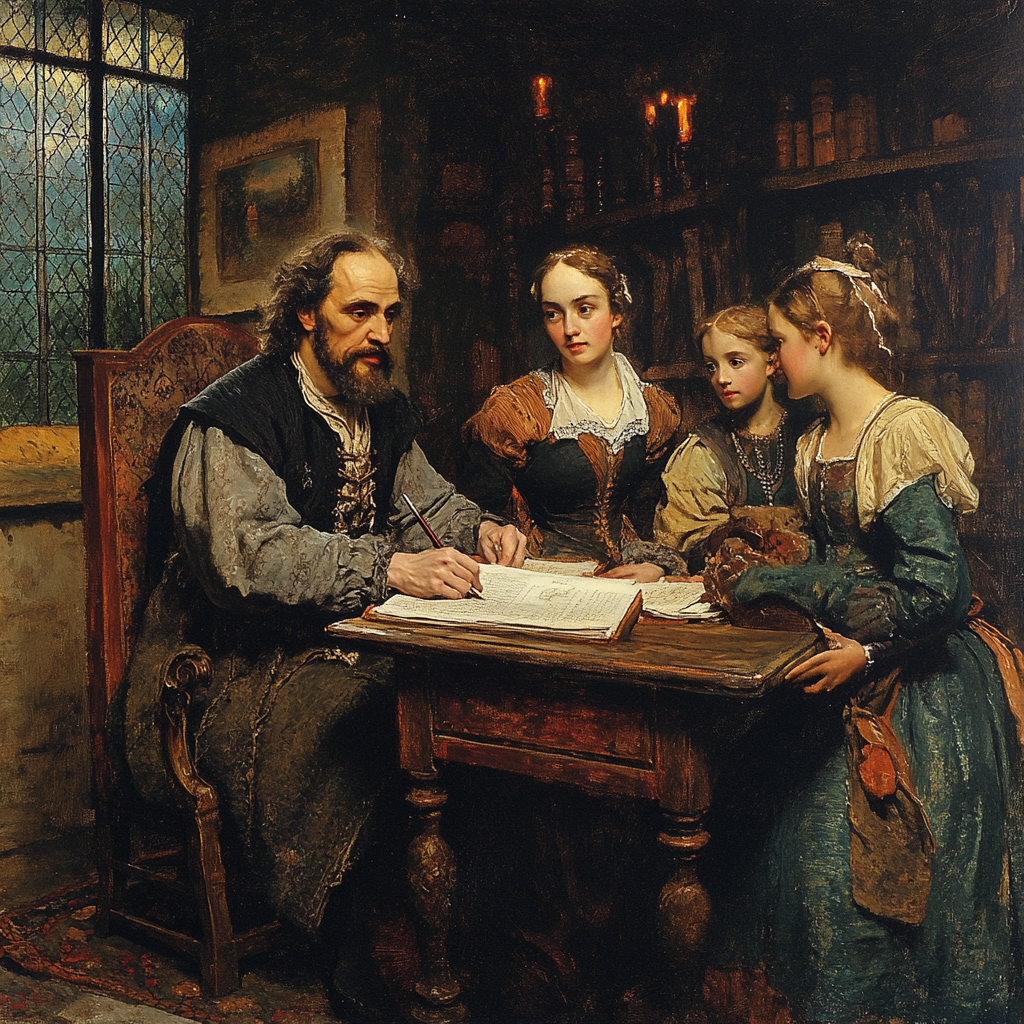“Is this a dagger which I see before me, the handle toward my hand?” – William Shakespeare’s family history, often regarded as the greatest playwright and poet in the English language, left behind a legacy that continues to captivate and inspire audiences centuries after his passing. His works, such as “Romeo and Juliet,” “Hamlet,” and “Macbeth,” are celebrated for their timeless themes and masterful storytelling. Today, we will delve into the fascinating history of Shakespeare’s family and explore how his upbringing and lineage may have influenced his creativity and genius. By understanding the cultural and personal influences that shaped Shakespeare, we can gain a deeper appreciation for the man behind the timeless literary masterpieces.
Shakespeare’s Family Background

The Shakespeare Lineage
The Shakespeare family originated in Stratford-upon-Avon, a market town in Warwickshire, England. The family’s roots can be traced back to the medieval period, and they were likely of rural origins. The social and economic status of the Shakespeare family varied over the centuries. William Shakespeare’s father, John Shakespeare, was a successful glove maker and a prominent figure in the town’s affairs. He held various municipal offices and eventually became the town bailiff, which was the highest elective office in Stratford. This suggests that the family enjoyed a comfortable social and economic standing within the community. As for notable ancestors, William Shakespeare’s grandfather, Richard Shakespeare, was also involved in local government and held several public offices.
John Shakespeare: The Father
John Shakespeare was a prominent figure in Stratford-upon-Avon during the late 16th century. He began his career as a glove-maker and eventually expanded his business to include trading in various goods, such as wool and agricultural products. His success in business led to his involvement in local politics, where he served as an alderman and later as the high bailiff of Stratford. Despite his rise to prominence, John Shakespeare faced financial struggles later in his life. Records show that he was fined for various offenses, which led to a decline in his social standing and financial stability. This decline may have been due to economic downturns in the wool trade and other factors beyond his control.
Mary Arden: The Mother
Mary Arden was the mother of William Shakespeare and was born into a family of noble background. Her family, the Ardens, were landowners in Warwickshire, England, and were well-respected members of the local community. Their landownership and social status played a significant role in shaping Shakespeare’s understanding of class and status. Growing up in a family with noble ancestry and landownership would have provided Shakespeare with firsthand experiences of the privileges and responsibilities that come with such a status. This upbringing likely influenced his understanding of the social hierarchy and the dynamics of power and privilege in society, which is reflected in many of his plays.
Shakespeare’s Siblings and Early Family Life

Overview of Shakespeare’s Siblings
William Shakespeare had seven siblings, making him the third of eight children. His older siblings were Joan and Margaret, and his younger siblings were Gilbert, Joan, Anne, Richard, and Edmund. Joan and Margaret were his older sisters, with Joan being the eldest. They likely took on roles of responsibility and leadership within the family, as was common for the eldest siblings in that time period. Of his younger siblings, Gilbert and Richard followed in their father’s footsteps as glovers. Anne married a local innkeeper, and Edmund pursued a career as an actor. Significant tragedies that affected Shakespeare included the early death of his older sister Joan, as well as the death of his only son, Hamnet, at the age of 11.
Family Dynamics and Its Impact on Young Shakespeare
William Shakespeare grew up in a middle-class family in the town of Stratford-upon-Avon. His father, John Shakespeare, was a successful glove-maker and prominent local figure, while his mother, Mary Arden, came from a wealthy family. As the third of eight children, Shakespeare had a close relationship with his siblings and was influenced by his parents’ values of hard work, education, and community involvement. Despite the family’s relative prosperity, they faced challenges such as financial difficulties and the social and political unrest of the time. These experiences may have influenced Shakespeare’s understanding of human nature and the complexities of family dynamics, as evidenced in his plays.
Marriage and Shakespeare’s Own Family

Anne Hathaway: His Wife
Anne Hathaway was the wife of William Shakespeare, the renowned playwright and poet from the Elizabethan era. The couple married in 1582 and had three children together. Their marriage has been a subject of interest for scholars and historians, as it is believed to have had an impact on Shakespeare’s works. Some experts speculate that the themes of love, marriage, and family in Shakespeare’s plays may have been influenced by his own relationship with Anne Hathaway. For example, the portrayal of strong and complex female characters in his works, such as Lady Macbeth and Juliet, may have been inspired by his experiences with his wife. Additionally, the challenges and complexities of marriage and family dynamics in his plays may have been reflective of his own personal life.
Shakespeare’s Children
Shakespeare had three children with his wife Anne Hathaway: Susanna, Hamnet, and Judith. Susanna was the oldest, while Hamnet and Judith were twins. Tragically, Hamnet died at the young age of 11, leaving a deep emotional impact on Shakespeare and his family. The death of his son is believed to have influenced Shakespeare’s writing, particularly in the creation of his play “Hamlet.” Scholars have suggested that the grief and loss experienced by Shakespeare after Hamnet’s death may have found expression in the themes of mourning, mortality, and the struggle with fate that are prevalent in “Hamlet” and other tragedies.
Influence of Family on Shakespeare’s Work

Reflection of Family Themes in His Plays
In the works of William Shakespeare, recurring family dynamics play a crucial role in shaping the narratives of his plays such as King Lear, Hamlet, and Romeo and Juliet. These dynamics often revolve around themes of power struggles, betrayal, love, and the complexities of familial relationships. Shakespeare’s personal experiences may have influenced these narratives, as he himself experienced the complexities of familial relationships and the impact of power dynamics. His own family life, particularly his relationship with his parents and siblings, could have provided him with insights into the intricacies of family dynamics. In King Lear, the dynamic between Lear and his daughters explores themes of power, betrayal, and the consequences of familial discord.
Exploration of Social Class and Heritage
Shakespeare’s understanding of class and heritage greatly informed his plays, including Macbeth, The Merchant of Venice, and Henry IV. These works often explore themes of power, ambition, and social hierarchy, reflecting the societal structures and values of his time. In Macbeth, for example, Shakespeare delves into the corrupting influence of ambition and the consequences of power. The play grapples with the idea of the divine right of kings and the impact of noble lineage on one’s fate. In The Merchant of Venice, issues of class and heritage are central to the plot, as the characters navigate questions of wealth, status, and societal expectations. The play also addresses themes of prejudice and discrimination, particularly against the backdrop of religious and cultural differences.
Tragedies and Loss in His Writing
The personal family tragedies, including the death of Shakespeare’s son Hamnet, undoubtedly had a profound impact on the playwright and inspired darker themes in his works. The death of Hamnet at a young age is believed to have influenced Shakespeare’s exploration of themes of grief, loss, and mortality in his plays. One specific work that can be linked to this personal tragedy is Shakespeare’s play “Hamlet.” The loss of a young prince and the themes of grief, revenge, and existential crisis in the play are thought to be influenced by Shakespeare’s own experience of losing his son. Additionally, the play “King Lear” also delves into themes of family tragedy, loss, and betrayal, which may have been influenced by Shakespeare’s personal experiences.
The Legacy of Shakespeare’s Family

The Shakespeare Family After His Death
After his death, his descendants and family members continued to carry on his legacy. Many of them followed in his footsteps and pursued similar careers or continued to uphold the values and principles he stood for. His influence on their lives is evident in the way they continue to honor his memory and carry on his work in their own ways. His legacy has served as an inspiration for future generations and has had a lasting impact on his family members, shaping their values and guiding their decisions.
How Shakespeare’s Family History Continues to Resonate

In recent years, there has been a growing interest in understanding the family history of many famous writers, including [author’s name]. This interest stems from the belief that a deeper understanding of an author’s personal background and experiences can provide valuable insights into their literary works. In the case of [author’s name], researchers and historians have made significant discoveries about his lineage that have shed new light on his works. For example, recent genealogical research has revealed previously unknown connections to influential figures in art and literature, which may have influenced his creative process and thematic choices. Furthermore, the study of [author’s name]’s family history has also provided a context for understanding the cultural and historical influences that shaped his writing.
Shakespeare’s family heritage played a significant role in shaping his creativity and genius. Coming from a well-established family in Stratford-upon-Avon, Shakespeare was exposed to a rich cultural and intellectual environment from an early age. His father, John Shakespeare, was a prominent figure in the community, and his mother, Mary Arden, came from a family of landowners and local gentry. This background provided Shakespeare with a solid foundation in literature, history, and the arts, which undoubtedly influenced his work as a playwright and poet. The enduring impact of Shakespeare’s family and his works on literature and culture cannot be overstated.













